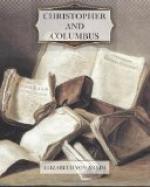Anna-Rose let herself be led away, and they went to their cabin; and when they came out of it half an hour later, no longer with that bald look their caps had given them, the sun catching the little rings of pale gold hair that showed for the first time, and clad, instead of in the disreputable jerseys that they loved, in neat black coats and skirts—for they still wore mourning when properly dressed—with everything exactly as Aunt Alice had directed for their arrival, the young men of the second class could hardly believe their eyes.
“You’ll excuse me saying so,” said one of them to Anna-Felicitas as she passed him, “but you’re looking very well to-day.”
“I expect that’s because I am well,” said Anna-Felicitas amiably.
Mr. Twist, when he saw them, threw up his hands and ejaculated “My!”
“Yes,” said Anna-Felicitas, who was herself puzzled by the difference the clothes had made in Anna-Rose after ten solid days of cap and jersey, “I think it’s our hats. They do somehow seem very splendid.”
“Splendid?” echoed Mr. Twist. “Why, they’d make the very angels jealous, and get pulling off their haloes and kicking them over the edge of heaven.”
“What is so wonderful is that Aunt Alice should ever have squeezed them out of Uncle Arthur,” said Anna-Rose, gazing lost in admiration at Anna-Felicitas. “He didn’t disgorge nice hats easily at all.”
And one of the German ladies muttered to the other, as her eye fell on Anna-Felicitas, “Ja, ja, die hat Rasse.”
And it was only because it was the other German lady’s hair that spent the night in a different part of the cabin from her head and had been seen doing it by Anna-Felicitas, that she cavilled and was grudging. “Gewiss,” she muttered back, “bis auf der Nase. Die Nase aber entfremdet mich. Die ist keine echte Junkernase.”
So that the Twinklers had quite a success, and their hearts came a little way out of their boots; only a little way, though, for there were the Clouston K. Sacks looming bigger into their lives every minute now.
Really it was a beautiful day, and, as Aunt Alice used to say, that does make such a difference. A clear pale loveliness of light lay over New York, and there was a funny sprightliness in the air, a delicate dry crispness. The trees on the shore, when they got close, were delicate too—delicate pale gold, and green, and brown, and they seemed so composed and calm, the twins thought, standing there quietly after the upheavals and fidgetiness of the Atlantic. New York was well into the Fall, the time of year when it gets nearest to beauty. The beauty was entirely in the atmosphere, and the lights and shadows it made. It was like an exquisite veil flung over an ugly woman, hiding, softening, encouraging hopes.




